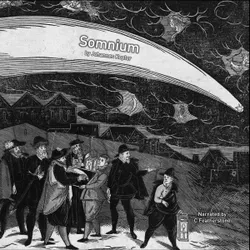Harmonies of the World Johannes Kepler - Johannes Kepler published Harmonies of the World in 1619. This was the summation of his theories about celestial correspondences, and ties together the ratios of the planetary orbits, musical theory, and the Platonic solids. Kepler's speculations are long discredited. However, this work stands as a bridge between the Hermetic philosophy of the Renaissance, which sought systems of symbolic correspondences in the fabric of nature, and modern science. And today, we finally have heard the music of the spheres: data from outer system probes have been translated into acoustic form, and we can listen to strange clicks and moans from Jupiter's magnetosphere.Towards the end of Harmonies Kepler expressed a startling idea,--one which Giordiano Bruno had been persecuted for, two decades before--the plurality of inhabited worlds. He muses on the diversity of life on Earth, and how it was inconceivable that the other planets would be devoid of life, that God had "adorned[ed] the other globes too with their fitting creatures"
Harmonies of the World
Kom igång med den här boken idag för 0 kr
- Få full tillgång till alla böcker i appen under provperioden
- Ingen bindningstid, avsluta när du vill
Författare:
Språk:
Engelska
Format:

The Philosophy of Style

Memory: How to Develop, Train, and Use It

The Road to Xanadu

The Tremendous Power of Prayer

The Expositor's Bible: The Book of Revelation : Enriched edition.

The Philosophy of Style : Enriched edition.

The Ether of Space : Enriched edition.

The Gods : From 'The Gods and Other Lectures'

The Little Green Book of Getting Your Way : How to Speak, Write, Present, Persuade, Influence, and Sell Your Point of View to Others

Health, Healing & Faith : Enriched edition. New Thought Book on Effective Prayer, Spiritual Growth and Healing

As a Man Thinketh : Classic Wisdom for Proper Thought, Strong Character, & Right Actions

How I Raised Myself From Failure to Success in Selling


